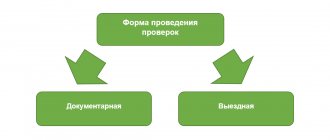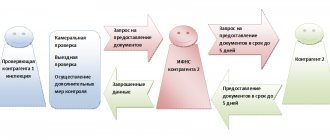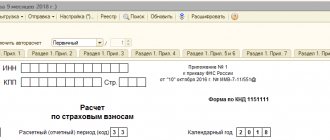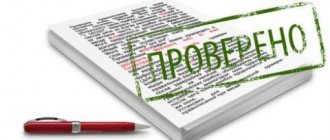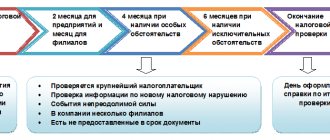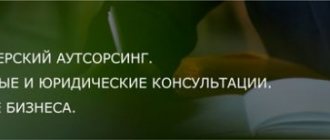Types of checks
Rospotrebnadzor inspections come in several types:
- Planned , carried out every 3 years on the basis of a schedule drawn up for the year. You can view the plan on the official website. It describes when, who and what will be checked. The entrepreneur will be informed about the start of a scheduled inspection at least three days before it begins. The notice may be sent by mail or delivered in person. In 2017-2018, small businesses were exempt from scheduled inspections. Exception: organizations in the fields of healthcare, education, and public events. The full list is in Law N 294-FZ. As for 2021, legislators, at the end of 2021, extended the period of “test holidays” for another two years, until December 31, 2021 (see Law No. 480-FZ of December 25, 2018). The exceptions remain the same.
- Unscheduled. These include monitoring the implementation of instructions to eliminate violations and inspections based on complaints and other information from citizens. Not every request can be a reason for an unscheduled inspection. For example, an applicant will be refused if actual cases of violation are not indicated, or if they are reported anonymously. Moreover, an unscheduled inspection by Rospotrebnadzor must be approved by the prosecutor's office. The entrepreneur is informed about an unscheduled inspection one day before it begins (exception: food-related industries - an unscheduled inspection may come to them without warning). In emergency cases, when there is a threat to the health of people or animals, permission from the prosecutor's office and notification of the person being inspected are not required.
- Visiting and documentary. Depending on whether the inspector will personally come to the enterprise, or will only request a package of documents for inspection.
Highlights of the Scheduled SES Inspection for 2021
A video conference between regions of the country was held to discuss the implementation of the program. Moreover, the head of government announced the key points at the very beginning of the meeting: The planned inspection of the SES for the 2021 control year will be carried out only in case of risk, with a preliminary distribution into categories of supervised objects, which is also relevant for unscheduled inspections. From now on, the “stick system” will be abolished, leaving only improved real indicators in priority, and not the number of fines issued. There is a need to review the requirements addressed to business. In the fall, plans should be drawn up to reduce and update this category. Next, the requirements will be assigned codes for each of the areas of state control. Such a measure should allow everyone to achieve easy orientation in the space of rules. Checklists will also be introduced. Such checks are relevant for the areas of environmental management, federal communications supervision, fire supervision
Who can be checked
The wider the scope of control of the inspection body, the more organizations risk falling under its inspection. In this regard, Rospotrebnadzor is among the leaders. Almost any enterprise can be inspected, but most often companies that work closely with the public, that is, with consumers, in the service sector, trade, and education are inspected.
Simply put, Rospotrebnadzor controls any activity that involves consumer relations.
Fines for non-compliance with SANPIN
An important issue is the verification of special documents, the regulations of which are established by municipal or regional authorities.
To carry out the inspection, it is necessary to prepare all the necessary documents, involve a lawyer specializing in this field in the inspection, carefully study the inspector’s findings and carefully read the draft act.
It is worth noting: if violations are detected, the business entity is subject to an administrative fine of up to 500,000 rubles, or the operation of the enterprise is stopped for a fairly significant period.
What they check
Rospotrebnadzor carries out many functions; its inspections bring together specialists from various fields. Today, the control powers of the SanEpidemStation have been completely transferred to him.
For example, under the control of Rospotrebnadzor are:
- Compliance with consumer protection laws;
- Sanitary and epidemiological situation;
- Certification of workers in a number of areas (dealing with food);
- Social and hygienic audit;
- Compliance with legislation on energy saving and increasing energy efficiency.
Many Rospotrebnadzor inspections are unscheduled and initiated as a result of complaints from the public (for example, about loud music in an establishment or about garbage storage).
After receiving complaints, the territorial department of Rospotrebnadzor can initiate an inspection:
- Registration of labor relations with employees;
- Qualifications and certification of employees, availability of health certificates;
- Certificates for goods;
- Cash register machines in trade;
- Product quality (sample examination);
- Compliance of premises with standards (visual inspection and measurements).
Field of activity
The functions of Rospotrebnadzor extend to inspections of various service sectors. In accordance with Decree of the Government of the Russian Federation No. 332 of June 30, 2004, Rospotrebnadzor is responsible for:
- Monitoring compliance with sanitary standards in a grocery store, at a construction site, at a catering establishment, in medical centers, examination of food quality;
- Compliance with the requirements of the law on client rights;
- Drawing up a conclusion after control checks;
- Monitoring compliance with sanitary and epidemiological rules;
- Re-certification of employees working in production, transportation, and sale of food products;
- Statistical reporting.
What documents are checked?
During the inspection, Rospotrebnadzor inspectors pay attention to the presence and correct execution of the following documents:
- Constituent documents (TIN, Charter);
- Employee health records (if required);
- Production control program (how temperature and lighting in the premises are controlled, how often clothes are washed and cleaned);
- Licenses to carry out activities;
- Signs;
- Consumer corners;
- Price lists, catalogs, menus;
- Documents for the right to own or lease premises;
- Agreements with third-party organizations providing waste removal and disposal services, disinfection, etc.;
- Logs of sanitary and epidemiological inspections;
- Logbook for disinfection products (this must be registered in advance).
The main mistakes when providing services to beauty salons and hairdressers
Beauty salons and hairdressers have direct contact with the human body, so they are obliged to ensure compliance with all sanitary and epidemiological rules. For this:
- Instruments are thoroughly disinfected at all stages of work;
- An anti-HIV first aid kit and pediculicides should be available on site;
- There must be several sets of tools;
- staff must have health certificates, employees must be healthy;
- The premises are cleaned regularly;
- Linen for working with clients must be stored and washed according to certain rules.
In terms of documentation, very often staff and management neglect to maintain disinfection logs and carry out control measurements to determine the level of contamination.
In addition, a big mistake that can lead to the closure of the establishment is incorrect layout. There are certain regulations and norms for the distribution of workspaces, for which procedures separate rooms are allocated, what size they should be and how many personnel they should accommodate. Rooms must be allocated for storing hair and garbage, for washing, manicure, and others. The presence of exhaust ventilation is also important.
The inspector will definitely pay attention to the log of use of disinfectants, the presence of stickers on bottles of solutions, which will indicate information about the contents and the date of dilution. The frequency of tool processing and its preparation for work will also be checked.
How is the Rospotrebnadzor inspection carried out?
Scheduled inspections usually begin with an audit of the package of documents. Rospotrebnadzor requests a package of documents from the inspected entrepreneur. The request must be accompanied by a certified copy of the inspection order.
Since 2021, the inspector cannot demand documents and any information located in state registers (what they can check on their own, for example: TIN).
Copies of documents signed by the person being inspected must be provided within ten working days from the date of receipt of the request.
If the requested document relates to the subject of the audit and is not in the state information system, then it is impossible to avoid providing it. Otherwise, the entrepreneur faces an administrative fine.
The first important stage of an on-site inspection is the inspector presenting his personal identification and an order to conduct an inspection, which indicates who, when, whom, on what basis and how will be inspected.
The result of the inspection is an act (or conclusion), which lists the detected violations and instructions for further actions to eliminate them. One copy of the conclusion remains with the inspector, the second is given to the verified entrepreneur.
The following information must be included:
- When and where the conclusion was drawn up;
- Which body carried out control activities, which experts directly participated in the audit;
- Details of the order to begin the inspection;
- Information about the company being inspected, information about its manager (or representative) who was present during the inspection;
- Start and end date of the audit;
- What violations were discovered;
- Confirmation by the head of the company of familiarization with the act (instead of confirmation, you can immediately write a refusal of the conclusion indicating the reasons);
- A note about making a record of the inspection in the log book (or about the reasons why this was not done);
- Signatures of all specialists who took part in the inspection.
The inspector leaves his mark in the inspection log.
Recorded:
- Which authority carried out the inspection;
- Data from all experts participating in the inspection;
- When did the inspection take place, how long did it last;
- Reasons for verification, goals and objectives of the study;
- List of detected violations;
- Details of the conclusion drawn up based on the results of the inspection.
You can appeal the conclusion within three months from the date of receipt of the instructions. The complaint can be sent directly to the court or to a higher structure of the inspection body. The document must indicate what mistakes the inspectors made.
Based on the results of an inspection that reveals violations, an inspector from Rospotrebnadzor can:
- Draw up mandatory instructions;
- To fine;
- Suspend the operation of the enterprise until the violations are corrected;
- Bring the case to court (for example, on suspicion of the company’s involvement in a mass disease of the population).
Results of the Ministry of Internal Affairs regarding SES inspections for 2021
According to the report of Yuri Chaika, representing the Prosecutor General's Office, numerous problems in business became clear. Thus, over the past two years, actions have been taken to suppress about 150 thousand violations. Prosecutors were able to reject a little less than nine hundred thousand unreasonably formulated applications issued by regulatory authorities. This is significant for everyone affected by this issue. However, perfection is still far away. How the work will manifest itself in the future will be seen. In the meantime, you should study the schedule of scheduled SES inspections for 2021. During a direct meeting in Khabarovsk, the head of the Prosecutor General’s Office, Yuri Chaika, and the Minister, Alexander Galushka, representing the Ministry of Development of the Far East, jointly discussed the protection of the rights of investors in the Far Eastern Federal District. Previously, a survey was conducted in the regional development structure on the eve of the meeting. There are also questions about police work. During operational activities, agency employees have the right to seize documentation, office equipment, and completely block the organization’s activities. It is important that such measures are taken only with prior agreement with the prosecutor's office. However, this has not been legally supported to date. Although this problem has been under consideration since 2013. And proposals to legitimize events were previously supported both by the Public Chamber and the business community. But so far, events are only being rushed in the Ministry of Internal Affairs and other law enforcement agencies. verification of documents As a result, the Ministry of Internal Affairs is the leader in the number of violations committed in the process of exercising control powers in relation to entrepreneurs. In 2021, there are more than four thousand such cases. However, this is not a record, because in the Ministry of Emergency Situations the figure is almost two thousand more. There are more than two thousand violations under the SES. This is jointly carried out by Rostekhnadzor and SES; Rosreestr and SES account for one thousand violations each. It is expected that the planned reform of Rospotrebnadzor in 2021 will significantly change the situation for the better. As for the shortcomings in fulfilling the duties of supervisory structures, here the head of the Prosecutor General’s Office focuses on exceeding the permissible limits for the timing of inspection activities, the lack of inspections included in the annual consolidated plan. The inspections carried out were also noted, the motive for which was anonymous requests. According to the statement of the Prosecutor General, it became known that the government will consider a bill according to which disproportionate aspects should be eliminated in agreement with the departments of the prosecutor's office of inspections not planned in advance. inspection of products Minister Mikhail Abyzov received a statement that the implementation of administrative inspections will be equated to inspection actions. So it follows from this that before starting administrative investigative actions, they will have to be coordinated with the prosecutor’s office, and also regulated on the same basis as ordinary supervisory activities. These were the comments made by the minister. He also informed about the need to develop proposals in the regions regarding the delegation of a certain share of supervisory measures in specific areas that are economically significant or take place in life in a certain area. Based on the results of the activities carried out, it should be assumed that everything will happen to the SES in 2021 as part of the reform as conceived, planned and approved from above.
Violations by the inspectorate
The law also sets its own limits for inspectors from Rospotrebnadzor.
The inspected entrepreneur is obliged to know about them and monitor the implementation of:
- A scheduled inspection will not be recognized as legitimate if it took place without the presence of officials or representatives of the legal entity being inspected. Its results can be easily appealed. An exception is possible only if information has been received about violations that pose a threat to the health of people or animals, or state security;
- Inspectors do not have the right to take original documents or request data or products not related to the subject of the inspection;
- Verification deadlines must be met;
- The inspector can take samples for analysis only in accordance with established standards and with the mandatory drawing up of relevant acts;
- The inspector does not have the right to issue orders to carry out any control measures at the expense of the person being inspected;
- Any inspection results are considered a secret protected by law, and inspectors have no right to disclose it;
- The inspector cannot demand payment for the inspection or individual control activities.
Results
Rospotrebnadzor conducts scheduled inspections every three years (in some cases every two years).
The inspection is carried out according to checklists containing a closed list of questions - the inspector has no right to go beyond them. Based on the results of the inspection, a report is drawn up, and if violations are identified, an order is issued to eliminate them. You can find more complete information on the topic in ConsultantPlus. Free trial access to the system for 2 days.
Deadlines for Rospotrebnadzor inspections
According to the law, an inspection can last a maximum of 20 days, but there are exceptions when, by order of Rospotrebnadzor, the period is extended. The entrepreneur will be notified of the extension of the inspection. Although the procedure for this notification is not prescribed by law.
However, in a situation where a documentary inspection was initially carried out, but then it turned into an on-site inspection, the total period will be 40 days.
The maximum duration of an on-site inspection at a small enterprise is 50 hours per year, and at a micro-enterprise - 15 hours.
The scheduled on-site inspection is extended if complex studies are required. The maximum extension period is 20 working days.
The expert conducting the inspection has the right to put forward a proposal for an extension, but it must be approved by the person who previously signed the order to conduct the inspection. Only chief state sanitary doctors can extend the timing of inspections of small and micro-enterprises.
Whom Rospotrebnadzor checks regularly
In accordance with Part 1 of Art.
9 of the Law “On the Protection of Rights...” of December 26, 2008 No. 294-FZ Rospotrebnadzor can conduct scheduled inspections in relation to individual entrepreneurs and legal entities. Due to the spread of coronavirus infection in Russia, scheduled inspections in 2021 were canceled (clause 2 of the Decree of the Government of the Russian Federation “On the Features...” of 04/03/2020 No. 438). There is an exception to this rule: a scheduled inspection by Rospotrebnadzor for 2021 will come if the organization conducts activities with a high level of risk. You can check the company for compliance with this criterion using a special service.
Fines from Rospotrebnadzor
The responsibility of an entrepreneur for violations and errors that an inspection by Rospotrebnadzor may reveal is:
- Disciplinary;
- Administrative;
- Civil law;
- Criminal (for example, selling alcohol to children, illegal business, trafficking in counterfeit medicines).
The most common type of liability to Rospotrebnadzor is still administrative. Rospotrebnadzor fines range on average from 20,000 to 200,000 rubles.
Also, the company's activities may be suspended to eliminate violations. For any failure to comply with the instructions of the inspectorate, the violator will be held administratively liable.
For example, the following violations are considered administrative:
- Failure to comply with sanitary and hygienic measures;
- Sales of goods (services) whose quality does not comply with the law;
- Violation of the procedure for using cash register machines;
- Refusal to issue a check, receipt or other document confirming payment for services to a client;
- Deceiving customers (for example, body kit);
- Refusal to provide the consumer with information about the product or misrepresentation.
The most common fines of Rospotrebnadzor:
| Violation | Fine |
| Violation of sanitary requirements | 5-10 minimum wage, or suspension of work for three months |
| Failure to comply with standards for the use of non-residential premises | 10-20 minimum wages |
| Violation resulting in the spread of an infectious disease | 100-200 minimum wage and possibly imprisonment |
| Lack of a logbook for disinfection products | 20,000 rubles |
| Failure to comply with previously issued instructions | 10000-20000 rubles |
You can appeal against administrative liability within 10 days.
Main powers of the department
Rospotrebnadzor often carries out inspections in parallel with other regulatory authorities. Children's, educational and medical institutions, as well as representatives of the catering and retail sectors are most often subject to inspections. Inspections can be carried out scheduled or unscheduled. Rospotrebnadzor also conducts personnel certification, monitoring sanitary and epidemiological conditions and issuing a conclusion allowing further work.
The consumer has the right to file a complaint and request for verification if there are doubts about the quality of the services provided to him or the goods sold. Then unscheduled inspections will be carried out, which will confirm or refute the expressed suspicions, and will also lead to a further reaction from the regulatory authorities, up to the closure of the enterprise to eliminate non-compliance with regulatory legislation. When there is a threat to the lives of others, this check can be carried out immediately.
How to prepare for a Rospotrebnadzor inspection
The most reliable, but not the cheapest way to prepare for an inspection is to seek help from specialists. Many companies offer their services for consulting, collecting documents and organizing sanitary measures.
It is almost impossible to put all your activities in order on your own and in a short period of time. Therefore, the best decision is to conduct your business in such a way that an expert who comes at any moment has nothing to complain about.
Always keep employee health records and product certificates in order, observe the terms and conditions of storage of goods, carry out cleaning and disinfection on time, monitor signboards, price tags and the consumer corner.
To check yourself, check out the list of the most common violations.
What should pharmacies and in-office stores provide?
Stores at dental and other medical offices are very often faced with the lack of adequate, readable price tags made in the same style.
All institutions selling medical and cosmetic products very often neglect storage conditions. Temperature and light conditions are not observed, which is why the drugs deteriorate and do not have the effect for which they are designed.
When organizing a workspace, you should definitely adhere to the rules for equipping this room, depending on the types of drugs that will be sold. All microclimate indicators are ensured so that the products do not deteriorate or lose their quality.
Personnel are required to have health certificates and undergo regular medical examinations. Sick employees are not allowed to work.
The inspection will check the frequency of disinfection and cleaning work, documentary support for each product, and compliance with the standards and requirements of the products sold. Separately, the buyer’s ability to obtain complete information about any drug, both orally and in writing, is checked.
Common Disorders
Let's look at the most common violations that Rospotrebnadzor detects in beauty salons, medical centers, pharmacies, cafes and shops.
Violations of beauty salons and hairdressing salons:
- There is no required triple tool kit;
- There are no ultraviolet lamps and no accounting of their operation;
- Violation of the rules for processing tools;
- There are no markings on disinfectants and other products;
- There are no separate areas for manicure and pedicure;
- No foot bath;
- There is no special area designated for garbage or dirty laundry;
- Unsatisfactory sanitary condition of the premises;
- Employees did not undergo medical examination;
- There is no sign at the entrance.
Pharmacy violations:
- Non-compliance with SanPin requirements for temperature and humidity levels in the room;
- Violation of conditions and shelf life of medicines;
- Failure to comply with the washing regime for workwear;
- Employees did not undergo medical examination;
- Clients do not have access to information about medications (composition, price, contraindications).
Violations in public catering:
- There is no necessary ventilation of the room;
- Finished products are stored next to semi-finished products, and dirty dishes are stored next to clean ones;
- Acceptance and sale of products without accompanying documents confirming their quality and safety;
- Failure to comply with expiration dates and food processing rules;
- Employees are allowed to work without a medical examination;
- There are no markings on cutting tools;
- There is no hygienic (convenient for sanitation) coating on the working surfaces;
- There are no staff or tools for complete cleaning.
Violations of retail outlets:
- Failure to comply with sanitary and technical requirements for premises;
- Temperature and humidity in warehouses are not measured;
- Storing products in places not intended for this purpose;
- The products do not have markings that comply with the standards;
- There are no examination protocols, the frequency and scope of examinations are not observed;
- There is no complete information on the price tags.
Visual inspection of premises during inspection
Conducting an on-site inspection includes a visual inspection of the premises and the goods being sold or produced, the equipment and vehicles used, and the appearance of employees.
In this case, the presence of:
- a sign designed in accordance with all the rules;
- decorated buyer's corner;
- price tags and excise taxes on goods;
- information about suppliers and manufacturers of goods in a place accessible to the buyer (or ready for demonstration to the buyer);
- price list signed by the manager, etc.
During a visual analysis, measurements are taken of the area of the premises, the height and width of the openings of windows and doors, the compliance of the condition of the premises and equipment with sanitary standards, and the sufficiency of lighting of the premises are analyzed.
In addition, Rospotrebnadzor evaluates compliance with food preparation rules, the quality of goods and services provided.
How to behave during an inspection
Regardless of whether the inspection came to you as planned or unscheduled, do not panic, but try to follow our advice:
- Invite a lawyer. Notify other employees about the arrival of the inspection;
- Ask the inspectors to present their identification and an order to begin the inspection. Carefully check the documents for consistency of names, titles and dates;
- Study the inspection order (action plan, list of required documents), make sure that the inspection does not go beyond the specified scope;
- Ask the inspectors to sign the control log;
- After the inspection, carefully read the results recorded in the inspection report.
What kind of violations will inspectors look for:
1. Cleaning and disinfection.
According to the recommendations of Rospotrebnadzor, organizations are required to carry out regular cleaning and disinfection. Inspectors will require to see a log or schedule in which all cleaning is recorded, as well as a log for preparing the disinfection solution.
If there are no documents, inspectors may conclude that cleaning is not being carried out.
It will not help if the company carries out disinfection during an unscheduled inspection - Rospotrebnadzor will indicate that it is impossible to check whether cleaning was carried out with the required regularity before the inspection.
2. Insufficient supply of masks.
Companies are required to provide at least a 5-day supply of disposable masks for workers. The supply must be calculated taking into account changing masks at least every three hours.
There are no specific rules on how to do the calculation. But we can conclude that if a company has a normal 8-hour working day, then each employee should have at least 15 masks in stock. The employee receives the first mask at the beginning of the working day at 9 am, then changes the mask at 12 and 3 pm, and at 6 pm the working day ends - and so on for all five days.
During the inspection, officials will require to see the stock of masks and documents confirming the purchase.
3. No antiseptics.
If an organization, according to the recommendations of Rospotrebnadzor, must provide employees with antiseptics, inspectors will check this. For example, such requirements were for trade organizations and construction organizations.
Antiseptics must be registered - ordinary wet wipes will not work. Inspectors will ask to show a certificate for the antiseptic. The composition of hand sanitizer should include 60–80% isopropyl or ethyl alcohol (Rospotrebnadzor dated April 23, 2020 Information “On recommendations on how to choose an antiseptic against coronavirus.”
4. There is no certificate for the disinfectant.
For disinfection, the company is obliged to use only products that have passed state registration. Inspectors ask to provide a quality certificate and a certificate of state registration of the substance. Ordinary detergents or cleaning products will not work - this is a violation. If a company has a certified product, but the packaging has not been opened or the expiration date has expired, inspectors will also record a violation.
Rospotrebnadzor has established the requirements for disinfectants in a separate instruction (letter dated January 23, 2020 No. 02/770-2020-32). Additional requirements are contained in letters on the prevention of coronavirus in specific areas of activity (for example, in paragraph 2.7 of the letter of Rospotrebradzor dated 04/21/2020 No. 02/7495-2020-32). Make sure everything is ok.
Unfortunately, there is no official register of disinfectants that can be used without the threat of a fine. But we found out that in practice, inspectors check disinfection products on a special reference portal (https://dezreestr.ru/). You can quickly check the registration of a product if you cannot find a paper certificate.
5. No temperature log.
Inspectors require that the organization show a log that records daily temperature measurements of employees. If there is no thermometry log, Rospotrebnadzor will conclude that the company does not take preventive measures. Officials will also have questions if the log shows that not all employees had their temperatures measured.
6. No thermometer.
If an organization does not have a thermometer at all, inspectors immediately conclude that there is a violation. As a general rule, a thermometer does not have to be non-contact. For example, in trade organizations Rospotrebnadzor allows the use of contact thermometers, but they must be disinfected after each use (paragraph 2, clause 1.2 of the appendix to the Letter of Rospotrebnadzor dated 04/21/2020 No. 02/7495-2020-32).
More stringent requirements may be included in the regulations on preventive measures for your industry - these will have to be followed.
7. Cleaning equipment is not labeled or stored incorrectly.
According to sanitary rules, toilet cleaning equipment must be red marked and stored separately from the rest (clause 11.10. SanPiN 2.4.4.2599-10). Rospotrebnadzor considers it a violation if the same mop is used to clean a sanitary unit and work premises to prevent coronavirus.
8. Employees do not wear masks and gloves.
Controllers record this violation if they see employees without masks. Another situation is if the company does not have used masks at the time of inspection. Officials conclude that the organization is violating the mask changing regime. According to Rospotrebnadzor recommendations, masks should be changed at least every three hours. The company must collect used masks and seal them in two plastic bags.
9. Incoming control is not organized.
Officials will check whether the company measures the temperature of workers at the entrance to the organization. Organizations must remove from work employees with a fever or signs of ARVI (for example, clause 1.2. Appendix to the Letter of Rospotrebnadzor dated April 21, 2020 No. 02/7495-2020-32). In a number of inspections, Rospotrebnadzor asked to see a special local act - instructions on the procedure for incoming control.
10. Did not ensure social distancing.
In trade organizations, Rospotrebnadzor checks whether there are special markings for visitors. The markings must ensure a distance between people of at least 1 - 1.5 meters - requirements may vary in different regions. In federal recommendations, Rospotrebnadzor indicated a distance of 1.5 meters.
11. There are no devices for air disinfection.
Rospotrebnadzor indicated in letters that companies are required to use special devices for air disinfection in places where workers are constantly located, for example, in clause 2.8 of Rospotrebnadzor recommendations dated 04/21/2020 No. 02/7495-2020-32, clause 12 of Rospotrebnadzor recommendations from 04/18/2020 No. 02/7329-2020-27).
In practice, inspectors interpret this requirement more broadly - disinfectants are needed not only in the places where employees are located, but also in the places where visitors to the organization are located, for example, in trading floors (“places of large gatherings of people”). Each disinfectant has a limited coverage area, and inspectors require that the devices cover the entire area of the premises.
Officials will check the certificate for the disinfectant - if the device cannot be used in the presence of people, then this is also a violation.
12. A person responsible for prevention was not appointed.
Some controllers consider it a violation if the company does not have an order appointing someone responsible for preventive measures. We recommend preparing such an order so that unnecessary questions do not arise.
Specific sanitary and epidemiological requirements depend on the area of activity of the organization. In high alert mode due to coronavirus, make sure that the organization follows the general recommendations of Rospotrebnadzor (letters from Rosportebnadzor dated 04/20/2020 No. 02/7376-2020-24, March 10, 2021 No. 02/3853-2020-27).
13. Insufficient supply of disinfectants.
If an organization does not have a supply of disinfectants for at least five days, this is a violation. Supplies will be checked taking into account how many times a day and in what places the organization is obliged to carry out disinfection. In many recommendations, Rospotrebnadzor indicated that disinfection of office premises should be carried out daily, and various contact surfaces - every 2 - 4 hours (clause 2.5 of Rospotrebnadzor recommendations dated 04/21/2020 No. 02/7495-2020-32, clause 2.10 of Rospotrebnadzor recommendations dated 04/18 .2020 No. 02/7329-2020-27).


